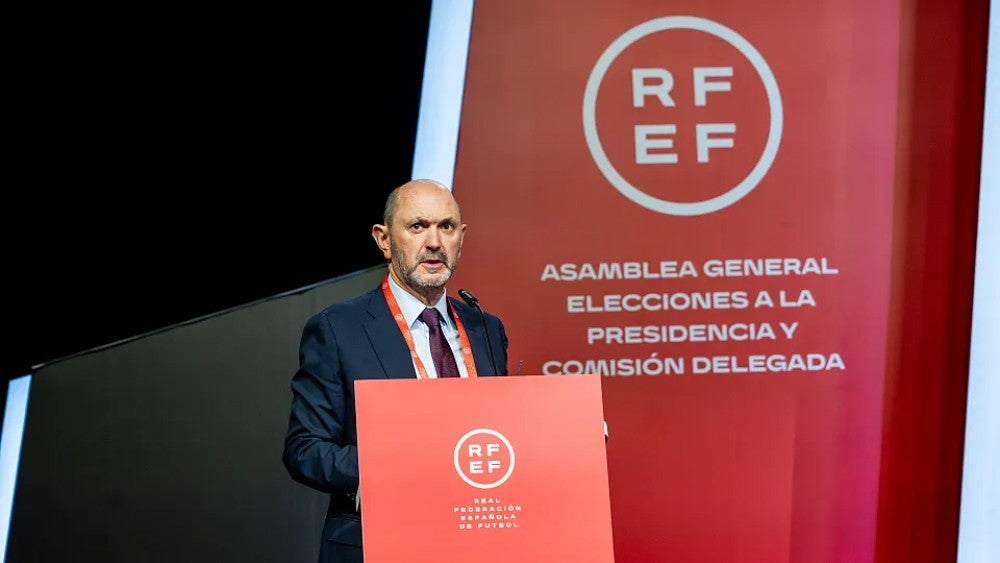
The crisis-hit Spanish soccer federation (RFEF) has elected Rafael Louzan as its new president despite facing a possible ban from holding public office.
The 57-year-old, head of the Galicia football federation since 2014, beat his counterpart in the Valencia region, Salvador Gomar, by 90 votes to 43 and will lead the RFEF to 2028.
However, his term could be short-lived as he is under investigation following a conviction for abuse of office in a previous role.
Spain's Supreme Court is assessing an appeal by Louzan, who could become the fourth RFEF president to be forced out of the job in less than eight years after Angel Maria Villar, in 2017, Luis Rubiales and then Pedro Rocha (both in the past 18 months).
The RFEF was seeking to move on from more than a year of turmoil sparked by former boss Rubiales' forced kiss on women’s player Jenni Hermoso at the Women’s World Cup final in 2023.
However, Louzan’s election could create more instability for the federation as it awaits the outcome of his case.

US Tariffs are shifting - will you react or anticipate?
Don’t let policy changes catch you off guard. Stay proactive with real-time data and expert analysis.
By GlobalDataIn his first public address after being elected, Louzan said: “The time has come to restore the prestige of this institution definitively. We need a body that inspires trust, one that is recognised for what it represents: the heartbeat of Spanish football.
“We need unity and cohesion. Those who know me understand that I don’t take positions just to sit idly by or stay on the sidelines. I want to act. And starting today, we will work to make up for lost time.”
The succession of scandals to rock the RFEF began in August 2023 when Rubiales forcibly kissed Hermoso on the lips after Spain won the Women's World Cup in Australia.
Rubiales, who denies any wrongdoing, relinquished his post in disgrace later that year amid a huge public outcry.
He was subsequently handed a three-year ban from all soccer-related activities by world governing body FIFA for kissing Hermoso.
Rubiales will stand trial in February 2025 with public prosecution requesting a sentence of two-and-a-half years in prison for sexual assault and coercion.
Rocha took interim charge and was elected by the RFEF as its permanent president in April this year despite being under investigation as part of an ongoing corruption case.
The CSD, Spain’s Higher Sports Council, suspended Rocha in July for making decisions beyond his remit after taking over as interim president.
His election caused controversy as the Spanish government formed a special committee to oversee the RFEF amid a corruption and money laundering investigation into the deal to take the Spanish Super Cup to Saudi Arabia.
Rocha was placed under investigation after he testified as a witness in the corruption probe into Rubiales who was arrested in April 2023.
Both Rocha and Rubiales have denied any wrongdoing.
Rubiales, who is accused of receiving illegal commissions during the process of negotiating a deal to stage the Spanish Super Cup in Saudi Arabia, was released soon after his detention on arrival in Madrid from the Dominican Republic, where he had been when police searched his home in March.
Prosecutors have said that the operation was part of a wider investigation into allegations of corruption in business, improper management of assets, and money laundering.
The probe is linked to allegations of corruption and money laundering after the Super Cup was moved to Saudi Arabia in 2020, in a deal reportedly worth more than €40 million ($42.8 million) per year. The current hosting deal in the kingdom is set to last until 2029.
Despite the crisis within the national governing body, the men's national team has achieved success this year, winning Euro 2024 and the gold medal at the Paris Olympics.
Last week, it was officially confirmed that Spain will co-host the 2030 men's World Cup with Portugal and Morocco and the RFEF is keen to rebuild its reputational damage and start planning for the tournament.
Meanwhile, the French Football Federation (FFF) has re-elected Philippe Diallo as president until the end of 2028.
Diallo overcame Pierre Samsonoff with a 55.34% share of a vote that took place in Paris last week.
The vote was comprised of amateur clubs, district leagues, and professional clubs, all of whom had an equal say in the election (33% of the vote each).
The result means that Diallo will now serve a full four-year term.
He was initially named interim president after Noel Le Great stepped down in January 2023 before taking on the role permanently to cover the remaining 18 months of the term of office Le Graet was meant to serve.
Le Graet officially resigned from the FFF presidency in late February 2023. There had been multiple allegations of harassment from several female FFF employees, as well as a separate controversy about derogatory comments he made regarding French soccer legend Zinedine Zidane.
A report eventually concluded that his “behavioral excesses are incompatible with the carrying out of his functions.”
He had been head of the FFF since 2011 and was re-elected in 2012, 2017, and March 2021.



